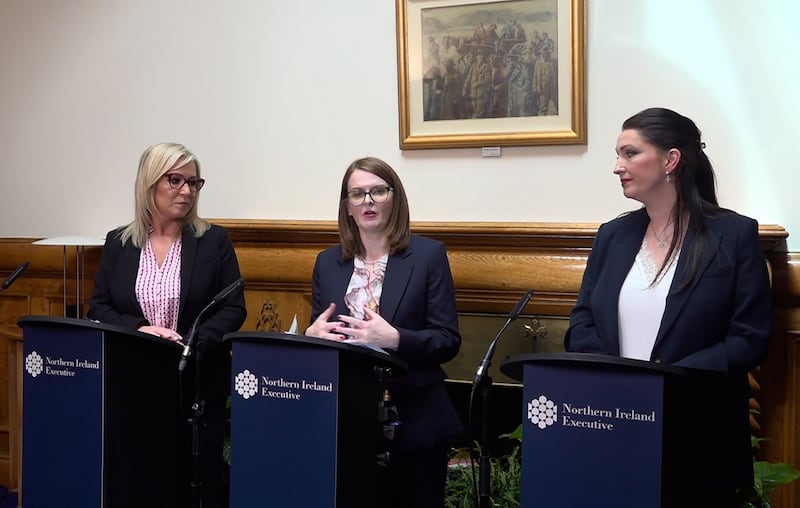Let me begin with three tweets which arrived on my timeline this week.
“Why does it look like every facet of government-run services here are just crap? In the case of water literally so, but take health, education and roads. You name it and we are being failed through poor governance and an ineffectual civil service.” (Marks Electric Car)
Why does it look like every facet of government run services here are just crap? In the case of water literally but take health, education, roads. You name it and we are being failed through poor governance and an ineffectual civil service @AlexKane221b @SJA_McC https://t.co/XxawFw4Qv4
— Marks Electric Car (@melectriccar) April 23, 2024
“Defecating chicken and rotten egg syndrome of our public administration. Westminster uninterested in NI’s needs and Stormont drifts with no efficiency, revenue-raising or transformational measures considered by ministers – and a dysfunctional, badly-led civil service – while services fail.” (Stephen McCormick)
“There has been no commissioner here in Northern Ireland, so any appointment is not scrutinised. Then there is the lack of governance by politicians who haven’t been here. A perfect recipe for disaster.” (red_mocha2022)
People sometimes think that columnists live in ivory towers, detached from the ‘ordinary folk on the ground’. We don’t. When you’ve been at the commentary game as long as I have, for example, and your face pops up regularly on television and by-line photographs in newspapers, then people, particularly those interested in politics, get to know you. There isn’t a day when I’m out (at a shop, filling station, café/restaurant, cinema, or dander in the park) when someone doesn’t come up and say, “Sorry to interrupt you, but…”
- Chuckles over spades and sliotars will only get first and deputy first ministers so far – Alex KaneOpens in new window
- Gestures are important but we need a Stormont with substance - The Irish News viewOpens in new window
- David McCann: Executive needs to do a few things well instead of lots poorlyOpens in new window
I genuinely don’t mind the interruptions, not least because the people involved come from all walks of life and backgrounds. More important, it also gives me the chance to ask all of them questions – usually about their opinion on the state of governance here.
And the answers to those questions are, generally speaking, negative. Indeed, I can sum up the collective opinions in one question: “Are we ever going to get a stable, effective government in this place?”
The grounds for optimism are not high. Three months into the latest assembly reboot and we are still waiting for programme for government.

Within days of returning, the executive realised that the few billion quid the government had put on the table would come nowhere close to addressing the sheer scale of the problems Northern Ireland faced.
Of course, this hasn’t stopped the individual ministers from participating in a bidding war that none of them can win in the absence of a collectively costed, agreed and rationalised list of priorities. And nor has it stopped the first and deputy first ministers planning another ‘begging bowl’ get-together with the PM, Secretary of State and Treasury – even though they haven’t agreed the priorities.
On a number of occasions since the assembly collapsed in December 2016 I wrote here and elsewhere that, in the absence of a functioning government, the parties could still meet below the radar and have serious discussions about financial requirements and project prioritising.

Indeed, much earlier than 2016 I was suggesting the need for genuine cooperation on key issues: not simply a programme for government, but a delivery process that would end the silo approach to spending and decisions, allowing the entire Executive to stand over and underpin the programme.
We are nowhere near reaching that point of collective government and cooperation. Ministers still have a go at each other through the media, even though they know that in most cases what they’re asking for cannot be funded because the funding resources aren’t there. So why even bother attacking each other?
Why can’t they try counting the actual pennies for a change, agree on a few immediate priorities and then get on with delivery between now and the end of the mandate in 2027?
The grounds for optimism are not high. Three months into the latest assembly reboot and we are still waiting for a programme for government
My reading of the responses I get in person and through my Twitter timeline is that very few people are expecting a miracle. Most of them know the nature of the mess we’re in.
That said, I think if they were to see prioritising and delivery – even in a limited number of areas for now – it would give them new-found confidence in the structures. And it might also convince the Treasury that it would be worthwhile sending more funding our way.
Let’s face it, why would anyone go the extra mile for us while the parties seem to turn every funding crisis into a nationalist/unionist/other battle?




